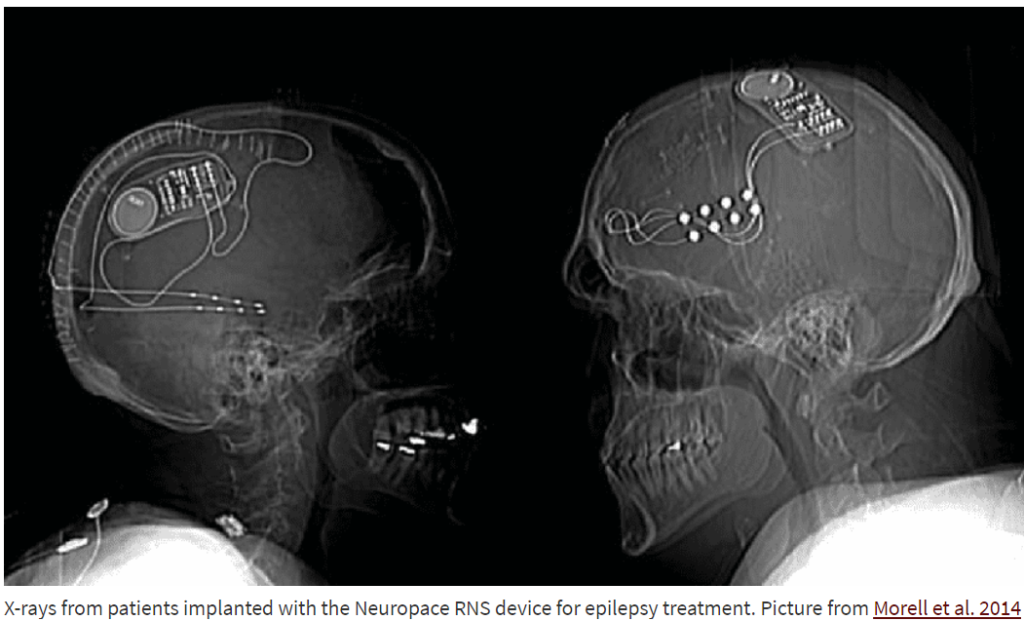Epilepsy and BCIs
A Unit for High School Biology and ELL Biology Courses

Grade Levels: 9-10
Subject(s): Biology, ELL Biology
Keywords: Epilepsy, brain-computer interfaces, homeostasis, feedback loops, neurotechnology, neuroethics
Activity Time: Twelve 50 minute class periods
Summary:
In this 3-week unit, students will explore the problem of what causes epileptic patients to have seizures and/or how neurotechnology works to help epilepsy patients with their seizures. Students will plan and conduct an investigation to show that feedback loops maintain homeostasis using the Muse 2 device that shows a person’s brain wave patterns (https://choosemuse.com/). They will then explore technology that uses feedback control as part of their treatments. Students will then evaluate the different neurotechnology using a Pugh Chart and make a decision for use for a child who has drug-resistant epilepsy. Finally, students will participate in a socratic seminar discussing the ethics about an epileptic patient.
Overview (Start here)
- Overview: Anchoring Phenomenon, Gapless Explanation, Unit Progression, Learning Standards, and Important Information
Lesson 1: Inquiry Lab for EEG
- Lesson Plan 1
- Slide Deck 1
- Student Handout 1.1: What is an EEG?
- Student Handout 1.2: EEG Inquiry Lab
Lesson 2: Epilepsy and Homeostasis
- Lesson Plan 2
- Slide Deck 2
- Student Handout 2.1: Loopy Simulation Assignment
- Teacher Resource 2: Loopy Simulation Assignment (Key for Student Handout 2.1)
Lesson 3: Neuroethics Socratic Seminar
- Lesson Plan 3
- Slide Deck 3
- Student Handout 3.1: Neuroethics Homework
- Student Handout 3.2: Neuroethics Case Study
- Student Handout 3.3: Student Facilitator Guide
- Student Handout 3.4: Socratic Seminar Self-Assessment
- Teacher Resource 3a: Key for Student Handout 3.1
- Teacher Resource 3b: Teacher Facilitator Guide
- Teacher Resource 3c: Extra Socratic Questions
Lesson 4: Pugh Chart and BCIs
- Lesson Plan 4
- Student Handout 4.1: Brain Technology Reading
- Student Handout 4.2: Brain Technology Worksheet
- Student Handout 4.3: Neurotechnology Recommendation Write-up Guide
- Teacher Resource 4a: Jamboard Version of Brain Technology Worksheet
- Teacher Resource 4b: Pugh Chart Excel Spreadsheet
Equipment: A Muse 2 headset is required for one of the lessons in this unit (https://choosemuse.com/). Potentially, a different EEG device, such as FlowTime, could be used.
Classroom Testing: These materials were designed during the summer session of the 2021 Research Experience for Teachers program and have not yet been tested in a classroom setting with students.
Credit: This curriculum unit was collaboratively developed by Michelle Castillo, a science teacher at Tyee High School (SeaTac, WA) and Rachael Kent, a science teacher at Summit Olympus High School (Tacoma, WA) as part of the 2021 Research Experience for Teachers program at the Center for Neurotechnology.
